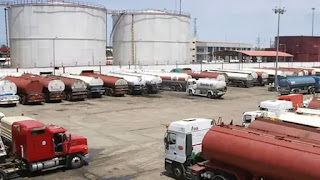There was palpable anxiety among members of the public yesterday, following a rise in the ex-depot price of petrol by 4.3% to N490 per litre. As a result, some petrol stations have started selling above N500 per litre, N12 higher than the N488 per litre price in the Lagos area.
But findings by Vanguard showed that NNPC Limited still sells the product to major marketers at N446.57 per litre.
A visit to private depots in Lagos showed that independent marketers, who lift at N490 per litre ended up selling it at N520 per litre at their stations depending on the location in Lagos.
It also indicated that while NNPC Limited continues to sell at N488 per litre in Lagos and environs at their retail stations, the major marketers fixed their prices at between N488 and N492 per litre, depending on location.
This is even as many operators who bought at N490 per litre were seen reselling at N515 per litre in a thriving black market, a development that has put additional price markups on retail prices.
The checks further showed that many independent marketers closed their gates against motorists and other users of the product while some hawkers were seen retailing petrol at exorbitant prices ranging from N550 to N650 per litre at Maryland, Ikorodu road and other parts of Lagos.
Regulator missing
Vanguard learned that officials of the Nigerian Midstream and Downstream Petroleum Regulatory Authority, NMDPRA, are not present to monitor and enforce sanctions against defaulters at the filling stations, a development that emboldened illegal operators to embark on sharp practices, especially pump manipulation and product diversion.
Reacting to the development yesterday, the President of Nigeria Labour Congress, NLC, Joe Ajaero, said organised labour was not “surprised by the antics of the marketers; that is why we are working on an alternative.
‘’PMS (petrol) is now for the rich. So, by the time we are through with alternatives, PMS will be left for the rich.”
Ajaero had earlier said as an alternative to PMS, Labour “came up with a module of having a Compressed National Gas, CNG, based on the fact that Nigeria has large natural gas deposits.
He added: “The study we found, especially the pilot study conducted in the Edo area where about 10,000 vehicles were converted to CNG, shows and the report came out from the mouth of the former Minister of State Petroleum Timipre Sylva, that a litre of gas CNG will cost about N90.
“On the basis of that, even Innoson Motors came to address us and said he was going to produce vehicles that will have provision for CNG and PMS, so if you don’t want to buy PMS at N500 and above per litre, you buy CNG.
“If you want to buy CNG at N90 per liter, buy it. But in the construction of the vehicles, you have a switch to whatever you want. If you switch to CNG, you use CNG; if you switch to PMS, you use PMS.
“It is now left for all Nigerians to determine the one that is our target. At least the labour movement has been able to think outside the box to provide this alternative.”
Deregulation drives change in price — IPMAN
On his part, the National President of the Independent Petroleum Marketers Association of Nigeria, IPMAN, Elder Chinedu Okoronkwo, stated: “The price is affected by foreign exchange; this is the beauty of deregulation as the price will be determined on the international market whether positive or negative, meaning that the price will not be static.
“With the recent floating of Naira and deregulation of the forex trading windows, allowing the value of Naira to be determined by market forces and the removal of subsidy on petrol, we should expect the situation to change constantly.”
We’re still far from deregulation — PROF. ILEDARE
Also, a petroleum economist and Executive Director of Emmanuel Egbogah Foundation, Professor Wumi Iledare, said, “For me, the removal of petroleum subsidy is not deregulation. Deregulation is all-embracing. The coast should be cleared for all market participants to have access to foreign exchange, import and market petrol in Nigeria. In other words, there should be a level of playing ground for all. This current system is breeding few sellers and larger buyers which would in turn bring shock to the system.
“Under deregulation, we should expect competition in the market and that does not exist in the petroleum industry as at today. To set the market and ensure fair play, there is need for serious and intentional regulation to checkmate irregularities.
“Also, there is need for a price modulation committee that would not remove the Value Added Tax, VAT and guarantee margin to avoid the payment of equalization fund. However, there should be more collaboration and experts engagement in ensuring a smooth and efficient perfect market deregulation.”
FG should tackle energy crisis —- CONSUMERS
In an interview with Vanguard, the President, Nigeria Consumer Protection Network, Kunle Olubiyo, urged government should work towards finding a lasting solution to the nation’s energy crisis.
He said the high price of petrol will likely affect activities in other sectors, especially as many households and organisations use petrol to generate their power.
Also, referring to the proposed increase in electricity tariff from July 1, 2023, he said: “It is expected that these efforts will naturally impact positively or negatively on electricity tariff and translates into general high cost of living in Nigeria depending on the school of thought or individual’s perception.
The last tariff increase in Nigeria was benchmarked on N400/$1 being the official exchange. As of today, the exchange rate is N750/$1. The electricity tariff was fixed on N400/$1, but foreign exchange is now based on N750/$1.
FG should sell 40% stake in Discos
In addition, Olubiyo said: “Moving forward, the government should pull out her 40% stake in the power sector and break the 11 Electricity Distribution Company’s franchise into smaller units in ways and manners that would break the present market monopoly and promote the ideals of the competitive electricity market.
“Government should address matters relating to domestic gas obligation, appropriate gas pricing and gas to domestic market should be sold in local currency (Naira) to owners of thermal power plants.
“Government should provide tax incentives, fiscal and non-fiscal incentives and access to long-term low-interest single-digit credit facilities to indigenous meters assembling plants / local meters manufacturers in order to strengthen their production capacity.
“End users of electricity in Nigeria should be given the opportunity to buy pre-paid meters on the shelves. More investment should be channelled into capacity expansion of critical power grid infrastructure and network improvements in order to achieve efficient service delivery.”
Elimination of fuel subsidy saves N7trn annually — CPPE
However, the founder, Centre for the Promotion of Private Enterprise, CPPE, Dr Muda Yusuf, had said: “The elimination of fuel subsidy will save an estimated N7 trillion annually, just as the “elimination of foreign exchange subsidy will unlock a minimum of N3 trillion revenue annually from the sale of CBN forex to the official foreign exchange window.”
CREDIT: VANGUARD.


